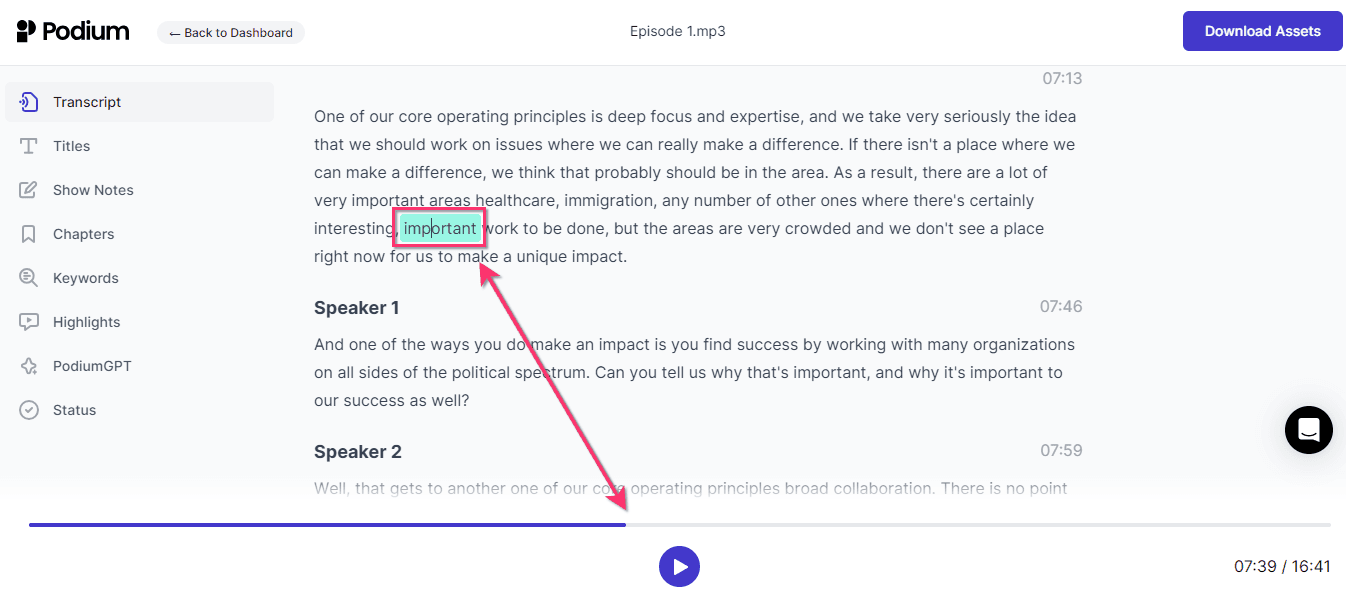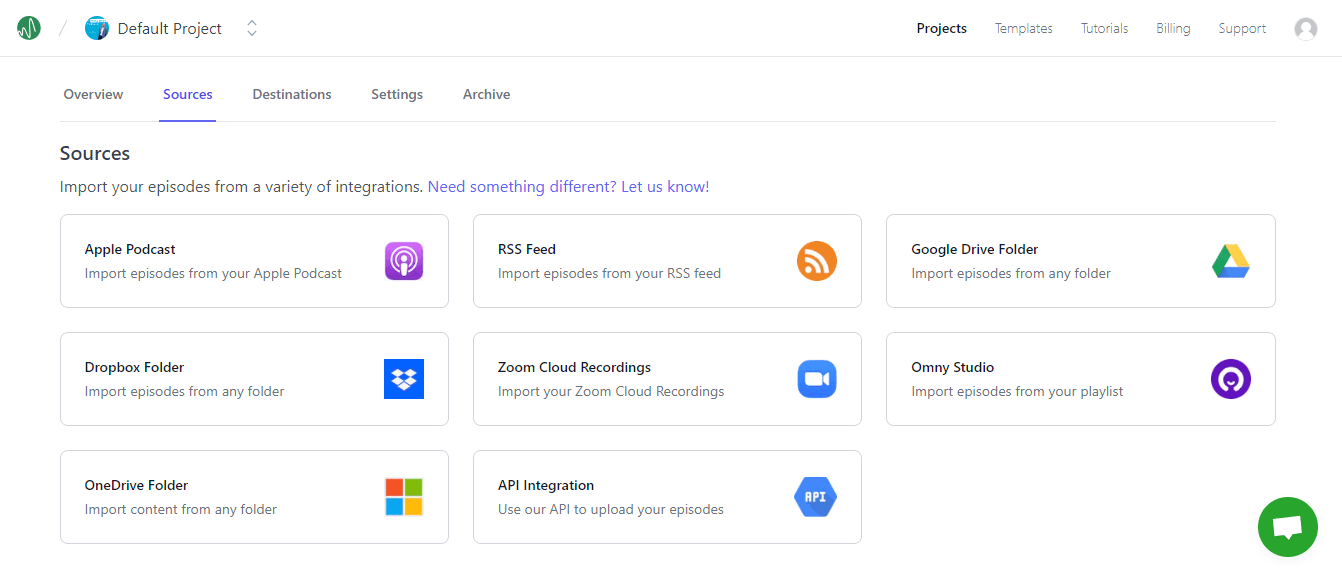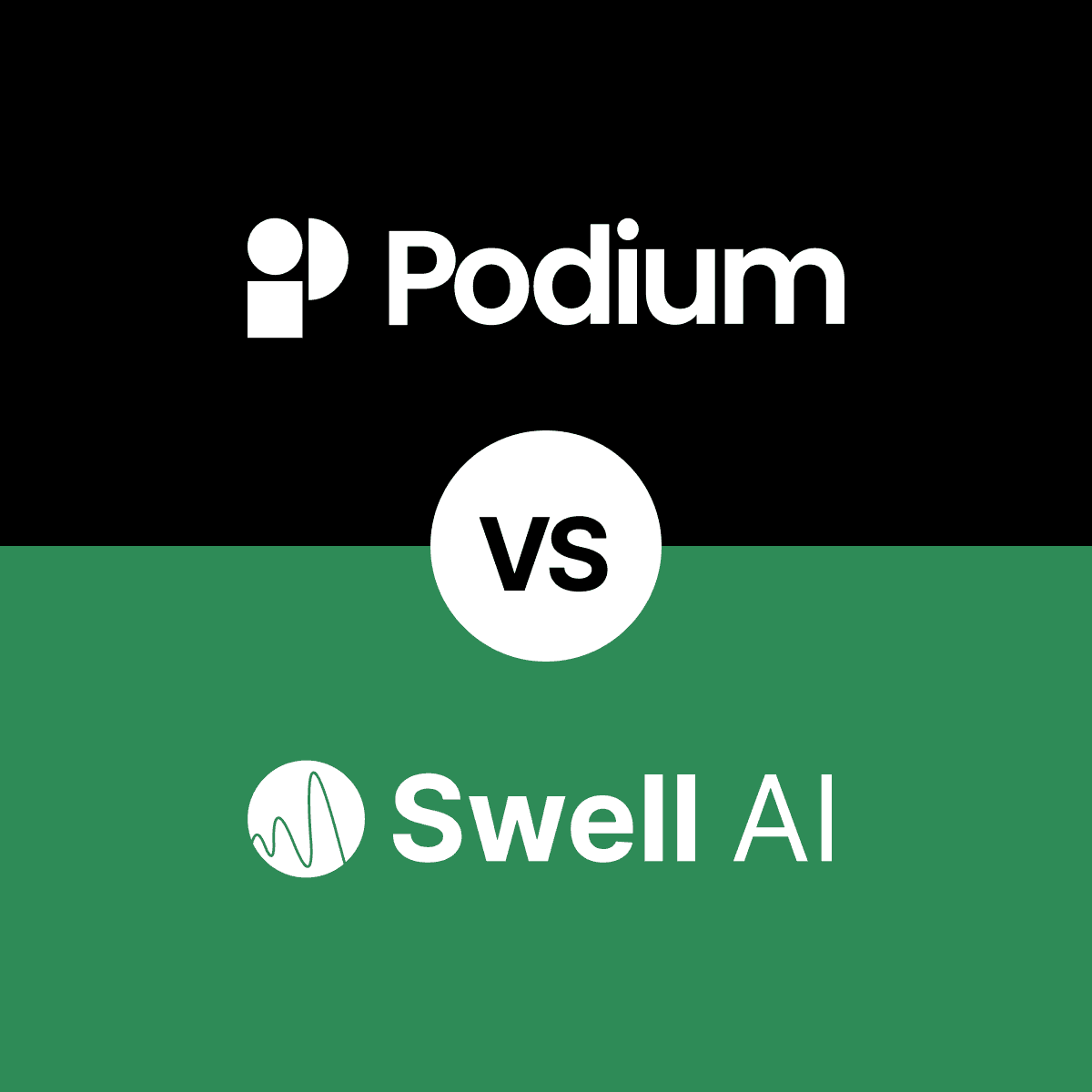Article
Swell AI vs. Podium: Which is Best? [2024]
Choose the right tool for your podcast content post-production
Summary
Choosing the right AI podcast copywriter for your show notes, transcripts, and other content is crucial for your podcasting workflow. This article provides an overview of the factors to consider when selecting an AI copywriter platform for podcast post-production and compares popular options like Swell AI and Podium.
Introduction
The rise of Artificial Intelligence has been a game-changer across various industries, and podcasting is no exception. In this arena, AI tools like Swell AI and Podium have become popular for their ability to simplify podcast production. These tools, while offering similar core functionalities, may have distinct characteristics.
On the surface, Swell AI and Podium seem to cater to the same need - making podcasting easier through AI-driven features like transcription and writing show notes. However, choosing between them isn't just about picking a tool; it's about finding the right fit for your specific podcasting needs. In this article, we’ll take a closer look at both Swell AI and Podium, comparing their features and capabilities in detail. Our goal is to help podcasters figure out which tool could be more suitable for them, based on what each platform has to offer. Let’s dive in and explore these AI tools to see which one stands out as the better choice for podcast creators.
Accuracy of the Transcript
When evaluating the accuracy of AI-generated transcripts, Podium stands out significantly. Its transcription accuracy rivals, and at times surpasses, that of many human transcription services. Podium excels in capturing the subtleties of language and employs punctuation more effectively, making its transcripts exceptionally reliable and easy to follow. This precision places Podium a step ahead of many other AI podcasting tools. Swell AI, while competent in delivering accurate transcripts, doesn't quite match up to Podium in this aspect. Podium also shines in its speaker diarization capability, which accurately identifies and differentiates between various speakers in a podcast.
Both Swell AI and Podium face challenges in accurately transcribing spoken URLs. Typically, when a speaker mentions a web address, neither tool consistently recognizes it as a clickable link. For instance, a spoken URL like "website.com/page" is often transcribed as "website dot com slash page". Swell AI occasionally manages to capture partial links, such as 'website.com', but it still falls short in transcribing the full URL. Podium, on the other hand, tends to struggle more in this aspect, often failing to recognize even the basic structure of a web address. This limitation is a notable area for improvement in both tools, as accurate link transcription can be a valuable asset in podcast show notes and transcripts.
Winner: Podium
Quality of the Content
In terms of content quality, Podium tends to deliver superior results, particularly in the language and style of writing. Its show notes summaries are characterized by a natural flow and a depth of content that sets them apart. While both Swell AI and Podium provide effective title suggestions, Podium's titles often exhibit a slightly more refined and engaging quality. Podium also offers a variety of summary versions and multiple title options, allowing users to select the style that best suits their needs.
Swell AI also presents multiple choices for summaries and title suggestions. Yet, these summaries tend to be more concise and, as a result, might lack the detailed richness essential for engaging podcast show notes. This brevity in Swell AI's content could leave some aspects of a podcast underrepresented in the show notes, which might be a critical factor for podcasters who prioritize thorough and character-rich summaries.
Winner: Podium
Features
Both Swell AI and Podium offer a comprehensive suite of features that cater to the core needs of podcast production. These include AI transcription, show notes summaries, title generation, chapters or timestamps, highlight clips, and an AI Assistant capable of creating a range of written content based on user prompts. Swell AI distinguishes itself with an 'ultimate show note' feature, which amalgamates summaries, timestamps, titles, and keywords into a single cohesive unit. This feature, while convenient, essentially compiles elements that can be manually assembled in a short time.
The feature sets of both platforms are so closely matched that it’s challenging to declare a definitive leader in this category. However, Podium does offer a unique advantage in its transcripts. It provides an integrated audio playback feature with highlighted text, allowing users to listen and simultaneously correct any inaccuracies within the Podium interface itself.

This functionality not only streamlines the editing process but also ensures a higher level of accuracy in the final transcript, enhancing the overall quality and user experience.
Winner: Tie
Ease of Use
When assessing the ease of use for both platforms, we enter a realm that is inherently subjective and qualitative. However, it is evident that Podium's interface stands out in terms of intuitiveness, particularly for users who aren't as technologically adept. The design and navigation of Podium are streamlined, offering a user-friendly experience that simplifies podcast management, even for those new to such tools.
On the other hand, Swell AI, with its broader range of import and export options, presents a somewhat more complex interface. This complexity, while offering versatility, can be slightly overwhelming for first-time users who are not as tech-savvy. Despite this, both platforms share a common organizational structure: content for each episode is arranged into individual pages, easily navigable through a panel on the left side of the screen. This aspect of design maintains a level of familiarity and ease in content management across both platforms.
Winner: Podium
Integrations
Swell AI demonstrates robust versatility with its array of integration options for file import and export. The platform facilitates the import of files from popular cloud storage services such as Google Drive, OneDrive, and Dropbox, along with direct imports from Apple Podcasts. Additionally, Swell AI supports file imports via RSS feeds and API integration, offering a comprehensive range of methods to suit various user preferences and needs.

Conversely, Podium adopts a more straightforward approach. It primarily focuses on a simple file upload system that is compatible with a wide range of audio and video formats. While this simplicity caters to ease of use, it is important to note that Podium does not offer the same breadth of integrations as Swell AI. Although there is an option for API usage, it is not readily accessible through the regular user interface and requires users to request API access. This distinction in integration capabilities could be a significant consideration for users who rely on seamless connectivity with various platforms and services for their podcasting workflow.
Winner: Swell AI
Pricing Model and Pricing Plans
Swell AI adopts a freemium model, granting users the convenience of one free upload per month. For more extensive use, their paid plans commence at $17 for three hours each month. An alternative option Swell AI offers is the purchase of credits, priced at $8.99 per hour, providing flexibility for those not preferring monthly subscriptions. Additional plans and detailed information are available on their billing page at Swell AI Billing.
Podium, on the other hand, features a free trial model which allows users to process up to three hours of audio at no cost. Following the trial, users can opt for a monthly subscription or buy credits for continued service. The subscription plans for Podium also start at $16 for three hours each month. Podium’s plans and pricing option can be viewed at their pricing page.
Putting Podium and Swell AI side by side, Podium presents a marginally more cost-effective option compared to Swell AI. However, this price difference is minimal and unlikely to be a decisive factor for users, particularly for the initial plan tiers. For those requiring higher volumes and larger plans, Podium may offer better value, making it an attractive option for users with more substantial needs, such as studio clients.
Winner: Podium
Conclusion
Comparing Swell AI and Podium side by side, it's evident that each platform has its unique strengths. Swell AI is equipped with a range of capabilities for importing and exporting files, effectively addressing a key aspect of user needs in content management. Podium, on the other hand, stands out for its superior content quality, high transcript accuracy, user-friendly interface, and slightly more affordable pricing structure. While the lack of diverse file importing options in Podium might be a consideration for some, its overall performance and cost-effectiveness make it a compelling choice. Ultimately, for users prioritizing content quality, ease of use, and cost, Podium emerges as the preferable option. This analysis highlights the importance of aligning a platform's features with specific podcasting requirements to make an informed decision in selecting the right tool for your podcast production needs.
